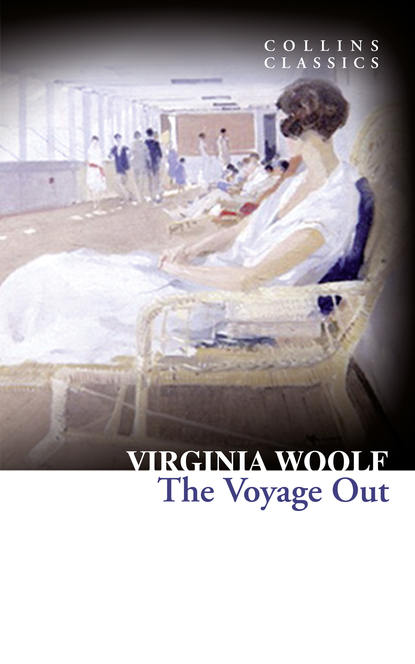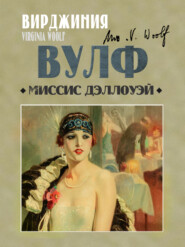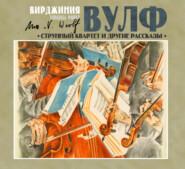По всем вопросам обращайтесь на: info@litportal.ru
(©) 2003-2025.
✖
The Voyage Out
Автор
Год написания книги
2019
Настройки чтения
Размер шрифта
Высота строк
Поля
Her yawn must have been the image of a yawn. Instead of letting her mouth droop, dropping all her clothes in a bunch as though they depended on one string, and stretching her limbs to the utmost end of her berth, she merely changed her dress for a dressing-gown, with innumerable frills, and wrapping her feet in a rug, sat down with a writing-pad on her knee. Already this cramped little cabin was the dressing room of a lady of quality. There were bottles containing liquids; there were trays, boxes, brushes, pins. Evidently not an inch of her person lacked its proper instrument. The scent which had intoxicated Rachel pervaded the air. Thus established, Mrs. Dalloway began to write. A pen in her hands became a thing one caressed paper with, and she might have been stroking and tickling a kitten as she wrote:
Picture us, my dear, afloat in the very oddest ship you can imagine. It’s not the ship, so much as the people. One does come across queer sorts as one travels. I must say I find it hugely amusing. There’s the manager of the line—called Vinrace—a nice big Englishman, doesn’t say much—you know the sort. As for the rest—they might have come trailing out of an old number of Punch. They’re like people playing croquet in the ’sixties. How long they’ve all been shut up in this ship I don’t know—years and years I should say—but one feels as though one had boarded a little separate world, and they’d never been on shore, or done ordinary things in their lives. It’s what I’ve always said about literary people—they’re far the hardest of any to get on with. The worst of it is, these people—a man and his wife and a niece—might have been, one feels, just like everybody else, if they hadn’t got swallowed up by Oxford or Cambridge or some such place, and been made cranks of. The man’s really delightful (if he’d cut his nails), and the woman has quite a fine face, only she dresses, of course, in a potato sack, and wears her hair like a Liberty shopgirl’s. They talk about art, and think us such poops for dressing in the evening. However, I can’t help that; I’d rather die than come in to dinner without changing—wouldn’t you? It matters ever so much more than the soup. (It’s odd how things like that do matter so much more than what’s generally supposed to matter. I’d rather have my head cut off than wear flannel next the skin.) Then there’s a nice shy girl—poor thing—I wish one could rake her out before it’s too late. She has quite nice eyes and hair, only, of course, she’ll get funny too. We ought to start a society for broadening the minds of the young—much more useful than missionaries, Hester! Oh, I’d forgotten there’s a dreadful little thing called Pepper. He’s just like his name. He’s indescribably insignificant, and rather queer in his temper, poor dear. It’s like sitting down to dinner with an ill-conditioned fox-terrier, only one can’t comb him out, and sprinkle him with powder, as one would one’s dog. It’s a pity, sometimes, one can’t treat people like dogs! The great comfort is that we’re away from newspapers, so that Richard will have a real holiday this time. Spain wasn’t a holiday…
“You coward!” said Richard, almost filling the room with his sturdy figure.
“I did my duty at dinner!” cried Clarissa.
“You’ve let yourself in for the Greek alphabet, anyhow.”
“Oh, my dear! Who is Ambrose?”
“I gather that he was a Cambridge don; lives in London now, and edits classics.”
“Did you ever see such a set of cranks? The woman asked me if I thought her husband looked like a gentleman!”
“It was hard to keep the ball rolling at dinner, certainly,” said Richard. “Why is it that the women, in that class, are so much queerer than the men?”
“They’re not half bad-looking, really—only—they’re so odd!”
They both laughed, thinking of the same things, so that there was no need to compare their impressions.
“I see I shall have quite a lot to say to Vinrace,” said Richard. “He knows Sutton and all that set. He can tell me a good deal about the conditions of ship-building in the North.”
“Oh, I’m glad. The men always are so much better than the women.”
“One always has something to say to a man certainly,” said Richard. “But I’ve no doubt you’ll chatter away fast enough about the babies, Clarice.”
“Has she got children? She doesn’t look like it somehow.”
“Two. A boy and girl.”
A pang of envy shot through Mrs. Dalloway’s heart.
“We must have a son, Dick,” she said.
“Good Lord, what opportunities there are now for young men!” said Dalloway, for his talk had set him thinking. “I don’t suppose there’s been so good an opening since the days of Pitt.”
“And it’s yours!” said Clarissa.
“To be a leader of men,” Richard soliloquised. “It’s a fine career. My God—what a career!”
The chest slowly curved beneath his waistcoat.
“D’you know, Dick, I can’t help thinking of England,” said his wife meditatively, leaning her head against his chest. “Being on this ship seems to make it so much more vivid—what it really means to be English. One thinks of all we’ve done, and our navies, and the people in India and Africa, and how we’ve gone on century after century, sending out boys from little country villages—and of men like you, Dick, and it makes one feel as if one couldn’t bear not to be English! Think of the light burning over the House, Dick! When I stood on deck just now I seemed to see it. It’s what one means by London.”
“It’s the continuity,” said Richard sententiously. A vision of English history, King following King, Prime Minister Prime Minister, and Law Law had come over him while his wife spoke. He ran his mind along the line of conservative policy, which went steadily from Lord Salisbury to Alfred, and gradually enclosed, as though it were a lasso that opened and caught things, enormous chunks of the habitable globe.
“It’s taken a long time, but we’ve pretty nearly done it,” he said; “it remains to consolidate.”
“And these people don’t see it!” Clarissa exclaimed.
“It takes all sorts to make a world,” said her husband. “There would never be a government if there weren’t an opposition.”
“Dick, you’re better than I am,” said Clarissa. “You see round, where I only see there.” She pressed a point on the back of his hand.
“That’s my business, as I tried to explain at dinner.”
“What I like about you, Dick,” she continued, “is that you’re always the same, and I’m a creature of moods.”
“You’re a pretty creature, anyhow,” he said, gazing at her with deeper eyes.
“You think so, do you? Then kiss me.”
He kissed her passionately, so that her half-written letter slid to the ground. Picking it up, he read it without asking leave.
“Where’s your pen?” he said; and added in his little masculine hand:
R.D. loquitur: Clarice has omitted to tell you that she looked exceedingly pretty at dinner, and made a conquest by which she has bound herself to learn the Greek alphabet. I will take this occasion of adding that we are both enjoying ourselves in these outlandish parts, and only wish for the presence of our friends (yourself and John, to wit) to make the trip perfectly enjoyable as it promises to be instructive…
Voices were heard at the end of the corridor. Mrs. Ambrose was speaking low; William Pepper was remarking in his definite and rather acid voice, “That is the type of lady with whom I find myself distinctly out of sympathy. She—”
But neither Richard nor Clarissa profited by the verdict, for directly it seemed likely that they would overhear, Richard crackled a sheet of paper.
“I often wonder,” Clarissa mused in bed, over the little white volume of Pascal which went with her everywhere, “whether it is really good for a woman to live with a man who is morally her superior, as Richard is mine. It makes one so dependent. I suppose I feel for him what my mother and women of her generation felt for Christ. It just shows that one can’t do without something.” She then fell into a sleep, which was as usual extremely sound and refreshing, but visited by fantastic dreams of great Greek letters stalking round the room, when she woke up and laughed to herself, remembering where she was and that the Greek letters were real people, lying asleep not many yards away. Then, thinking of the black sea outside tossing beneath the moon, she shuddered, and thought of her husband and the others as companions on the voyage. The dreams were not confined to her indeed, but went from one brain to another. They all dreamt of each other that night, as was natural, considering how thin the partitions were between them, and how strangely they had been lifted off the earth to sit next each other in mid-ocean, and see every detail of each other’s faces, and hear whatever they chanced to say.
CHAPTER 4 (#ulink_6fc4f5e8-0afc-5341-90cb-d3631e96dd0f)
Next morning Clarissa was up before anyone else. She dressed, and was out on deck, breathing the fresh air of a calm morning, and, making the circuit of the ship for the second time, she ran straight into the lean person of Mr. Grice, the steward. She apologised, and at the same time asked him to enlighten her: what were those shiny brass stands for, half glass on the top? She had been wondering, and could not guess. When he had done explaining, she cried enthusiastically:
“I do think that to be a sailor must be the finest thing in the world!”
“And what d’you know about it?” said Mr. Grice, kindling in a strange manner. “Pardon me. What does any man or woman brought up in England know about the sea? They profess to know; but they don’t.”
The bitterness with which he spoke was ominous of what was to come. He led her off to his own quarters, and, sitting on the edge of a brass-bound table, looking uncommonly like a sea-gull, with her white tapering body and thin alert face, Mrs. Dalloway had to listen to the tirade of a fanatical man. Did she realise, to begin with, what a very small part of the world the land was? How peaceful, how beautiful, how benignant in comparison the sea? The deep waters could sustain Europe unaided if every earthly animal died of the plague to-morrow. Mr. Grice recalled dreadful sights which he had seen in the richest city of the world—men and women standing in line hour after hour to receive a mug of greasy soup. “And I thought of the good flesh down here waiting and asking to be caught. I’m not exactly a Protestant, and I’m not a Catholic, but I could almost pray for the days of popery to come again—because of the fasts.”
As he talked he kept opening drawers and moving little glass jars. Here were the treasures which the great ocean had bestowed upon him—pale fish in greenish liquids, blobs of jelly with streaming tresses, fish with lights in their heads, they lived so deep.
“They have swum about among bones,” Clarissa sighed.
“You’re thinking of Shakespeare,” said Mr. Grice, and taking down a copy from a shelf well lined with books, recited in an emphatic nasal voice:
“Full fathom five thy father lies,
“A grand fellow, Shakespeare,” he said, replacing the volume.
Clarissa was so glad to hear him say so.
“Which is your favourite play? I wonder if it’s the same as mine?”

















